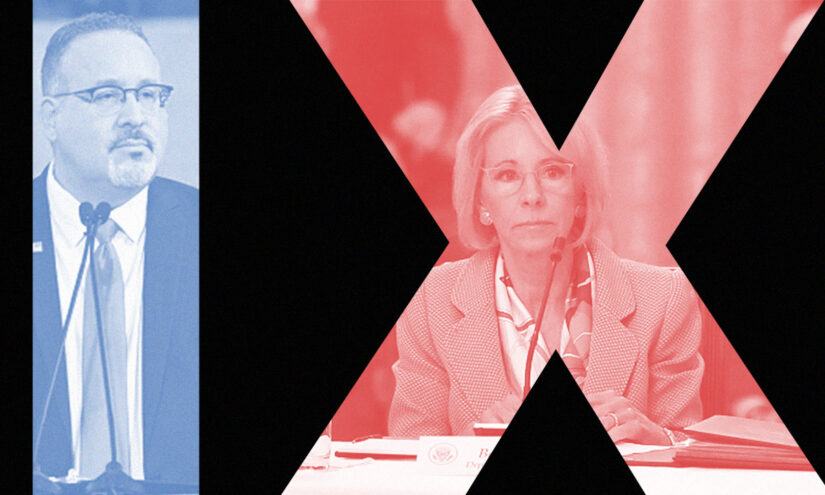During this summer, a team of students from MIT embarked on a journey to the sou …
Title IX revision shifts the legal focus towards victims, including LGBTQ students
Emma Wordsmith

The U.S. Department of Education reinstated protections for students against sexual harassment and assault on Friday, which were previously argued to have been lost under the previous administration.
The new Title IX rule, effective August 1, mandates that districts promptly investigate complaints, even if off school grounds, and extend these protections to LGBTQ students. Districts are also required to train school employees on addressing sex discrimination.
Education Secretary Miguel Cardona emphasized during a call with reporters, “These regulations ensure safe, welcoming schools that respect everyone’s rights. Title IX’s prohibition of sex discrimination encompasses all forms of sex discrimination. No one should be hindered from attending or completing school due to pregnancy. No one should experience bullying or discrimination based on their identity or whom they love.”
However, a second, more contentious rule regarding transgender students’ participation in school sports remains unresolved, with speculation that the administration is delaying it until after the election.
Republican objections to the included measures are anticipated to spark a fresh wave of litigation. House education committee chair, Republican Rep. Virginia Foxx, questioned the incorporation of transgender students under Title IX, contending that the revision weakens protections for women.
President Joe Biden had promised to revamp Title IX even prior to the 2020 election, citing a Supreme Court opinion granting LGBTQ employee protections to students. However, the Department of Education took over two years to release an initial draft outlining its new approach, with a proposed rule regarding trans students’ sports participation following in early 2023.
Delays in finalizing these rules have been attributed to both extensive public input and strong backlash from Republicans, who assert that allowing transgender women to compete in alignment with their gender identity undermines Title IX’s original intent.
Advocates and congressional Democrats have raised concerns that the delays put victims at risk and deter students from reporting incidents under the assumption that schools may not act.
“For many students, a weakened Title IX harassment rule has been the norm throughout their educational experience,” said Shiwali Patel, a senior counsel at the National Women’s Law Center, emphasizing the increasing attacks on LGBTQI+ students’ rights by extremist politicians.
On Friday, advocates celebrated what they perceive as a crucial step in revising the rule, noting that many school districts may not be fully prepared to implement the necessary proactive measures.
“There is still a lack of readiness and outdated policies in some school districts,” said Sanda Hodgin, founder and CEO of the Title IX Consulting Group, highlighting the importance of having informed Title IX coordinators to navigate the new requirements.
Districts are now required to promptly investigate any sex-based hostile environment in educational programs, both on and off school premises, but the revised rule eliminates the need for live hearings with cross-examination for sexual misconduct cases.
Former Education Secretary Betsy DeVos had included this provision to safeguard the due process rights of male students accused of harassment or misconduct, a move that Catherine Lhamon, assistant secretary of education for civil rights, criticized as relegating schools to be “no more than not deliberately indifferent” to harassment.
Despite legal challenges from Republican-led states, the Biden administration has mandated compliance with its executive order extending Title IX protections to LGBTQ students. The administration faces potential lawsuits over the extension of protections to gender identity, with concerns raised about potential infringements on free speech and discrimination claims.
In a recent federal appeals court decision, the court upheld the Biden administration’s interpretation of Title IX protections for LGBTQ students in athletics, blocking a West Virginia law that banned a trans student from participating in sports according to her gender identity.
The case of Becky Pepper Jackson, a 13-year-old transgender girl and middle school track athlete, has drawn significant attention, with West Virginia Attorney General Patrick Morrissey actively contesting the ruling by appealing to the U.S. Supreme Court to allow the Save Women’s Sports Act to be enforced.
In its proposed draft for sports under Title IX, the education department sought to strike a balance by permitting schools to limit transgender students’ participation in certain sports but not imposing a blanket ban. The guidelines indicate that most elementary and middle school students could play sports aligned with their gender identity, but limitations could be applied at higher competitive levels.
Advocates are hopeful that the department will issue a definitive rule clarifying its stance on the inclusion of transgender students in sports to provide transparency on these contentious issues.
Republican presidential nominee Donald Trump has vowed to prevent men from competing in women’s sports if elected, suggesting a polarized discourse on Title IX regulations.


